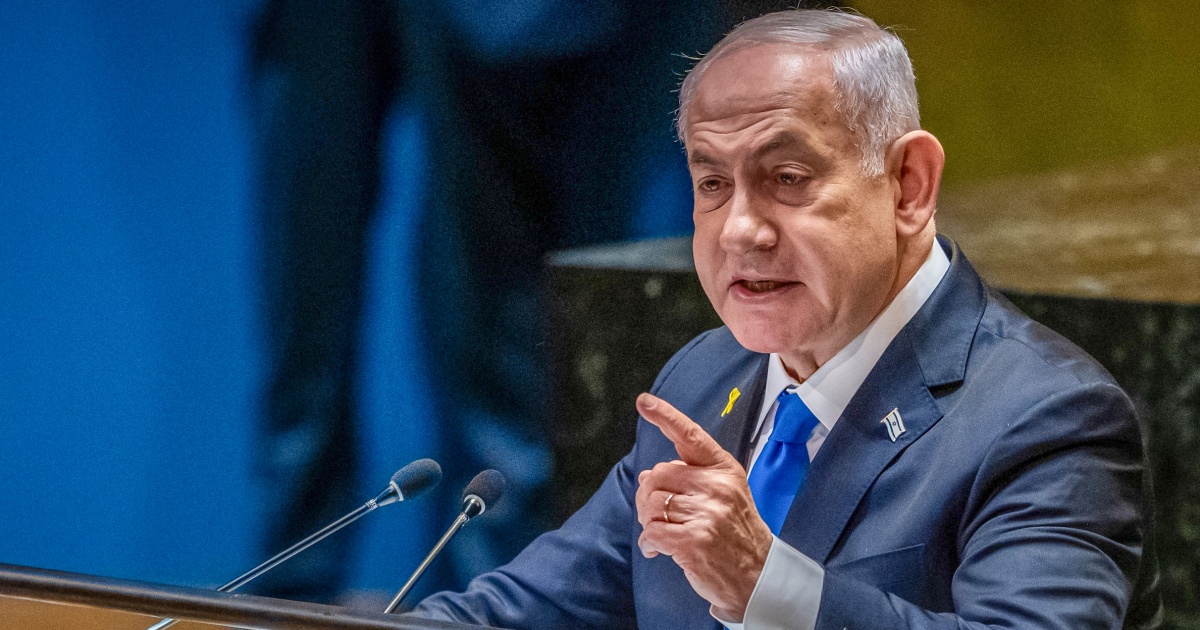Israel’s Prime Minister Benjamin Netanyahu defiantly faced an international community from which he has become deeply isolated amid international condemnation of Israel’s war in the Gaza Strip and the military’s fresh escalations in Lebanon.
Netanyahu opened his speech before the United Nations’ General Assembly in New York on Friday by saying he had not planned to attend, “but after I heard the lies and slanders leveled at my country by many of the speakers at this podium, I decided to come here and set the record straight.”
In the cavernous hall, there was applause, cheers and boos from the public gallery, which included relatives of Israeli hostages who had traveled there with Netanyahu. As the General Assembly president called the room to order, groups of diplomats stood up and walked out of the room, leaving a sparse audience on the delegate floor.
Saying that more resolutions have been passed by the General Assembly against Israel in the last decade than against the the rest of the world’s countries, he called the U.N. a “house of darkness” and a “swamp of antisemitic bile.”
For much of the speech, Netanyahu tried to rally opposition to Iran and its proxies, saying “if you strike us, we will strike you. There is no place in Iran that the long arm of Israel cannot reach, and that’s true of the entire Middle East.”
“We will fight until we achieve total victory, there is no substitute for it,” Netanyahu said.
On Thursday, thousands of protesters gathered near the U.N.’s First Avenue headquarters and across Midtown Manhattan, holding signs reading “bring the hostages home,” “end the war” and “stop killing children.” In response to Netanyahu’s name, they chanted “Shame! Shame! Shame!”
Some of the protests’ organizers called for Netanyahu’s arrest and accused the Israeli prime minister of being a war criminal.
Netanyahu had struck a defiant tone earlier after landing in New York, telling reporters on the airport tarmac that his government “will not stop” its fight against Hezbollah. The Iran-backed group has been trading fire with Israel since Hamas’ Oct. 7 terrorist attacks, when 1,200 people were killed and 251 people were taken hostage inside Gaza. More than 40,000 people have been killed in Gaza in Israel’s ensuing war with Hamas.
The U.S., France and other governments have scrambled to advance a 21-day cease-fire proposal in response to recent waves of airstrikes and threats of a ground invasion aimed at beating back Hezbollah.
So far, more than 700 people have been killed in Lebanon and hundreds of thousands displaced.
About 60,000 people have been displaced from northern Israel since Oct. 7 by Hezbollah’s rocket and drone attacks. Before the most recent round of airstrikes that began on Monday, about 110,000 people had been displaced from southern Lebanon. This week, hundreds of thousands more have been driven from their homes, with an estimated 70,000 in official shelters. Others have fled into neighboring Syria or are staying in hotels or with family members.
The U.N.’s condemnations of Israel and its treatment of Palestinians in the war in Gaza and beyond have been unequivocal and come steadily from the international institution’s many agencies.
Earlier this month, the General Assembly passed a historic, if symbolic, resolution with an overwhelming majority, demanding that Israel withdraw from the Palestinian territories within a year. In an emergency session in December, it called for an “immediate humanitarian ceasefire” and the release of all hostages, passing the resolution with a large majority. The resolutions, like all General Assembly resolutions, are non-binding and were resoundingly ignored by Israel.
The International Court of Justice, the U.N.’s top court, issued a landmark opinion in July calling Israel’s settlements in the West Bank violations of international law. In May, it ordered Israel to stop its assault on Rafah, which followed a January order for Israel to do everything it can to prevent genocidal acts in Gaza. The ICJ has no powers to enforce its rulings.
In March, Francesca Albanese an expert for the U.N. Human Rights Council said that Israel was committing genocide in Gaza, publishing a report with details that the council said back up the accusation. Israel has repeatedly refuted accusations of genocide in Gaza.
Netanyahu has regularly called the U.N. anti-Israel, and Israel has stoked an increasingly combative relationship with the international body, including accusing UNRWA, the U.N.’s agency for Palestinian refugees, of collaborating with Hamas.
U.N. Secretary-General António Guterres has said that Netanyahu has not spoken with him since the start of the war, leaving his phone calls unanswered and unreturned.
On Wednesday, after Israel began new waves of airstrikes on southern Lebanon, Guterres warned that “hell is breaking loose in Lebanon” and that Security Council resolutions were being violated daily.
In Israel, the families of hostages and their supporters have pressured Netanyahu — often protesting in the streets by the thousands — to prioritize the hostages’ release with a cease-fire deal rather than a military solution.


